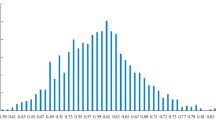Abstract
Word2vec-like word embeddings are known for kee** linguistic regularities and thus good for solving analogies. Following this, we explore such embeddings for Portuguese in the discovery of lexical-semantic relations, which can be used for augmenting lexical-semantic knowledge bases. In this exploratory approach, we tested different methods for discovering relations of different types and confirm that word embeddings can be used, at least, for suggesting new candidate relations.
Access this chapter
Tax calculation will be finalised at checkout
Purchases are for personal use only
Similar content being viewed by others
Notes
- 1.
https://github.com/vecto-ai (December 2019).
References
Bouraoui, Z., Jameel, S., Schockaert, S.: Relation induction in word embeddings revisited. In: Proceedings of the 27th International Conference on Computational Linguistics (COLING), pp. 1627–1637. ACL Press (2018)
Drozd, A., Gladkova, A., Matsuoka, S.: Word embeddings, analogies, and machine learning: beyond king - man + woman = queen. In: Proceedings of the 26th International Conference on Computational Linguistics: Technical Papers, pp. 3519–3530. COLING (2016)
Fellbaum, C. (ed.): WordNet: An Electronic Lexical Database (Language, Speech, and Communication). The MIT Press, Cambridge (1998)
Gladkova, A., Drozd, A., Matsuoka, S.: Analogy-based detection of morphological and semantic relations with word embeddings: what works and what doesn’t. In: Proceedings of the NAACL 2016 Student Research Workshop, pp. 8–15. ACL Press, June 2016
Gonçalo Oliveira, H.: Learning word embeddings from portuguese lexical-semantic knowledge bases. In: Villavicencio, A., et al. (eds.) PROPOR 2018. LNCS (LNAI), vol. 11122, pp. 265–271. Springer, Cham (2018). https://doi.org/10.1007/978-3-319-99722-3_27
Gonçalo Oliveira, H.: A survey on Portuguese lexical knowledge bases: contents, comparison and combination. Information 9(2), 34 (2018)
Harris, Z.: Distributional structure. Word 10(2–3), 146–162 (1954)
Hartmann, N.S., Fonseca, E.R., Shulby, C.D., Treviso, M.V., Rodrigues, J.S., Aluísio, S.M.: Portuguese word embeddings: evaluating on word analogies and natural language tasks. In: Proceedings of the 11th Brazilian Symposium in Information and Human Language Technology. STIL 2017 (2017)
Levy, O., Goldberg, Y.: Linguistic regularities in sparse and explicit word representations. In: Proceedings of the 18th Conference on Computational Natural Language Learning, pp. 171–180. ACL Press, June 2014
Linzen, T.: Issues in evaluating semantic spaces using word analogies. In: Proceedings of the 1st Workshop on Evaluating Vector-Space Representations for NLP, pp. 13–18. ACL Press (2016)
Mikolov, T., Chen, K., Corrado, G., Dean, J.: Efficient estimation of word representations in vector space. In: Proceedings of the Workshop track of International Conference on Learning Representations (ICLR) (2013)
Pennington, J., Socher, R., Manning, C.D.: GloVe: global vectors for word representation. In: Proceedings of the Empirical Methods in Natural Language Processing (EMNLP), pp. 1532–1543. ACL Press (2014)
Rodrigues, J., Branco, A., Neale, S., Silva, J.: LX-DSemVectors: distributional semantics models for portuguese. In: Silva, J., Ribeiro, R., Quaresma, P., Adami, A., Branco, A. (eds.) PROPOR 2016. LNCS (LNAI), vol. 9727, pp. 259–270. Springer, Cham (2016). https://doi.org/10.1007/978-3-319-41552-9_27
Speer, R., Chin, J., Havasi, C.: ConceptNet 5.5: an open multilingual graph of general knowledge. In: Proceedings of the 31st AAAI Conference on Artificial Intelligence, pp. 4444–4451 (2017)
Vylomova, E., Rimell, L., Cohn, T., Baldwin, T.: Take and took, gaggle and goose, book and read: evaluating the utility of vector differences for lexical relation learning. In: Proceedings of the 54th Annual Meeting of the Association for Computational Linguistics (Vol 1: Long Papers), pp. 1671–1682. ACL Press (2016)
Author information
Authors and Affiliations
Corresponding author
Editor information
Editors and Affiliations
Rights and permissions
Copyright information
© 2020 Springer Nature Switzerland AG
About this paper
Cite this paper
Sousa, T., Alves, A., Gonçalo Oliveira, H. (2020). Exploring Portuguese Word Embeddings for Discovering Lexical-Semantic Relations. In: Quaresma, P., Vieira, R., Aluísio, S., Moniz, H., Batista, F., Gonçalves, T. (eds) Computational Processing of the Portuguese Language. PROPOR 2020. Lecture Notes in Computer Science(), vol 12037. Springer, Cham. https://doi.org/10.1007/978-3-030-41505-1_38
Download citation
DOI: https://doi.org/10.1007/978-3-030-41505-1_38
Published:
Publisher Name: Springer, Cham
Print ISBN: 978-3-030-41504-4
Online ISBN: 978-3-030-41505-1
eBook Packages: Computer ScienceComputer Science (R0)




